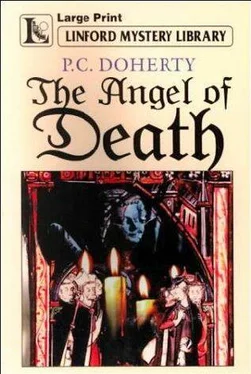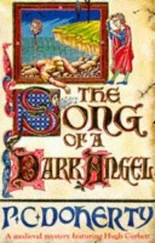Paul Doherty - Angel of Death
Здесь есть возможность читать онлайн «Paul Doherty - Angel of Death» весь текст электронной книги совершенно бесплатно (целиком полную версию без сокращений). В некоторых случаях можно слушать аудио, скачать через торрент в формате fb2 и присутствует краткое содержание. Жанр: Исторический детектив, на английском языке. Описание произведения, (предисловие) а так же отзывы посетителей доступны на портале библиотеки ЛибКат.
- Название:Angel of Death
- Автор:
- Жанр:
- Год:неизвестен
- ISBN:нет данных
- Рейтинг книги:4 / 5. Голосов: 1
-
Избранное:Добавить в избранное
- Отзывы:
-
Ваша оценка:
- 80
- 1
- 2
- 3
- 4
- 5
Angel of Death: краткое содержание, описание и аннотация
Предлагаем к чтению аннотацию, описание, краткое содержание или предисловие (зависит от того, что написал сам автор книги «Angel of Death»). Если вы не нашли необходимую информацию о книге — напишите в комментариях, мы постараемся отыскать её.
Angel of Death — читать онлайн бесплатно полную книгу (весь текст) целиком
Ниже представлен текст книги, разбитый по страницам. Система сохранения места последней прочитанной страницы, позволяет с удобством читать онлайн бесплатно книгу «Angel of Death», без необходимости каждый раз заново искать на чём Вы остановились. Поставьте закладку, и сможете в любой момент перейти на страницу, на которой закончили чтение.
Интервал:
Закладка:
The man stirred and looked into the pool of light. Edward had achieved a great deal in Scotland and the people may well have accepted him, but there was no excuse for Berwick. The man smiled mirthlessly and once more called up the bitterness behind his revenge. 'Oh God! How could God allow it? How could he?' He thought of his younger brother, the bland face and blond hair, the simple cornflower blue eyes. How much he had trusted him! How his brother had adored him. How he had accepted, childlike, his assurances that service with Edward of England would bring him great profit. How he could move and prosper, and how no finer place existed for business and commerce than the great town and castle of Berwick.
His brother had accepted his assurances and gone, only to perish with the rest in the terrible slaughter there.
The news had come slowly through pedlars, tinkers and the odd merchant. At first, the man had refused to accept what he heard; surely no king could do that? Edward of England, who styled himself as the great saviour of the West, could never order a town with all its men, women and children to be put to the sword? Such things were now past. They were against the laws and usages of war and Edward of England reverenced the law as he did the Blessed Sacrament. But when the truth came it was even more dreadful. Yes, Edward had ordered all the citizens of Berwick to be butchered. Thousands had died; some put it as high as ten thousand, others twice that number. The town had been completely sacked, inhabitants butchered without distinction of age sex or condition. Even those who had fled to the churches were slain within sanctuary, the sacred places treated blasphemously by the ordinary English soldier. And his brother? The man closed his eyes to hide the tears. Matthew must have died, his blue eyes glazing over, their look of puzzlement hidden by death. And Matthew's wife, the little children? How many had there been? Three or four. He remembered them from two years ago, when Matthew had been in London: they were peas out of a pod with their round cherubic faces and thick masses of blond hair. They had played in the cathedral forecourt, screeching with laughter at the sheer enjoyment of life. Now their lives were gone, snuffed out like the faltering flame of a candlewick, all because of the wrath of the King of England.
The man looked at the crucifix, his lips curled back like those of a snarling dog. He recalled a line from the Bible. What was it? 'I have made a pact with the dead,' he murmured, 'with Hell. I have come to an understanding.' How could he look at that crucifix? If God had stopped talking to him, he would stop talking to God. He rose, walked over to the altar and, grabbing the crucifix, twisted it till the alabaster head hung down to the floor. He returned, sat down and looked at the blasphemy he had committed. He did not care. He got up once again and, licking his fingers, snuffed out the candle. Now he was in the dark. What he planned was indeed best planned in the dark, though, when it happened, all would see. He would call on the forces of darkness, on his own strength, guile and cunning, to bring Edward of England as low as Hell itself.
2
'Sanctus, sanctus, sanctus.' The priest's hymn of praise to a thrice-holy God was taken up by the choir, their singing welling up to fill the huge nave of St Paul's Cathedral. Beneath its canopy of carved stone and wood, Walter de Montfort, Dean of St Paul's, with other canons of the cathedral began the incantation which marked the beginning of the important part of this solemn High Mass. The celebrant's gold and gem-encrusted vestments dazzled the eye, their colour and light being magnified by the hundreds of beeswax candles which stood upon and around the huge, high altar. The damask white altar-cloth with its gold fringes and purple tassels was already covered in pools of pure wax. The incense rose in huge fragrant clouds, warming the cold air and doing something to hide the stench of the populace packed in the cathedral. On the right side of the sanctuary sat Edward of England in his robes of state, a silver chaplet on his steel-grey hair. His face modelled itself in a look of piety as, under heavy-lidded eyes, he watched his opponent the dean celebrate the mass of peace before that same dean launched into a lengthy sermon on whether the Church should pay its taxes.
On either side of Edward sat his temporal and spiritual lords of England. On his immediate right was Robert Winchelsea, Archbishop of Canterbury, the principal mover behind this morning's pageant, a defender of the Church's right to grow wealthy but pay nothing. Edward disliked the man, a born conniver, who hid his political ambitions behind the intricacies of Canon Law, scriptural quotations and, if these failed, appeals to Rome. Edward should have drawn comfort from his great barons but these too he did not trust. The burly Bigod, Earl of Norfolk and Marshal of his armies: Edward had once respected the man but now, looking sideways, he glimpsed Bigod's puffy, pig-like features, a man, Edward thought, prepared to go to war and fight his enemies as long as it brought great profits to his own coffers. Beside him sat Bohun, Earl of Hereford, a thin weasel-like man with a loud voice and a brain which Edward privately considered no bigger than a bead. He would go where Norfolk led.
The only men Edward did trust were behind him, the clever clerks and lawyers who aided and assisted him in his government of the country. The chief of these, Edward's Senior Clerk of the Chancery and Keeper of the Secret Seal, Hugh Corbett, stirred restlessly on the gouged wooden stool he had been given to squat upon throughout this long and lengthy service. Corbett felt guilty. He loved the mass but hated these solemn occasions when Christ and his saints were hidden by the panoply and rituals of the church. Corbett stretched his legs and looked around. Beside him, his servant Ranulf wiped his snotty nose on his sleeve and, for almost the hundredth time since the service began, attempted to clear his throat of phlegm. Corbett glared at him. He knew Ranulf was ill with a slight fever, but he also suspected his servant took great glee in reminding Corbett of how ill he actually was.
The clerk, looking round the huge, muscular frame of his king, stared up across the sanctuary. The altar was a pool of light; priests, bishops, abbots, – the lay servers of the cathedral, the whole retinue of this marvellous edifice, all in attendance now concentrated on celebrating High Mass. The choir's paean of praise eventually ended and the reedy, strident voice of Walter de Montfort began the solemn, long prayer of the Consecration. Corbett curbed his impatience. He knew the service was only a charade; once it was finished the real politics would begin. Edward of England needed money; he wanted treasure to fight Philip of France abroad and crush the rebels in Scotland. He had taxed his people and his merchants; sold privileges and concessions in order to fill his war chests but now it was the turn of the Church.
To assist him, Edward had gathered his parliament, or virtually all of it, into one sweaty mass in this cathedral. They would hear mass, make reparation with God, take the sacrament and give each other the kiss of peace. Then the real business would begin. Corbett shifted uneasily on the rough wooden stool and pulled his cloak more firmly round him. It was bitterly cold; January 1299 would, he thought, be remembered by many for the terrible snowstorms which had swept the country. Outside, the snow lay two or three feet deep, whipped up by a savage cold wind which now pierced the cracks in the cathedral doors and whisded along the nave, making the candle-light dance and everyone shiver. Corbett felt guilty for thinking such secular thoughts as the mass swept towards the solemn point of consecration when the celebrant would take the bread and wine and utter the sacred words, transforming them into Christ's body and blood. Corbett quietly struck his breast and murmured 'Miserere, Miserere!' Beside him Ranulf sniffed once again, wiped a runny nose on his jerkin sleeve and looked sideways at Corbett, hoping his master would take note of the fresh insult. Ranulf loved Corbett but would never admit it, relishing every opportunity to stir, excite or alarm this usually serious-minded, rather grave clerk.
Читать дальшеИнтервал:
Закладка:
Похожие книги на «Angel of Death»
Представляем Вашему вниманию похожие книги на «Angel of Death» списком для выбора. Мы отобрали схожую по названию и смыслу литературу в надежде предоставить читателям больше вариантов отыскать новые, интересные, ещё непрочитанные произведения.
Обсуждение, отзывы о книге «Angel of Death» и просто собственные мнения читателей. Оставьте ваши комментарии, напишите, что Вы думаете о произведении, его смысле или главных героях. Укажите что конкретно понравилось, а что нет, и почему Вы так считаете.












